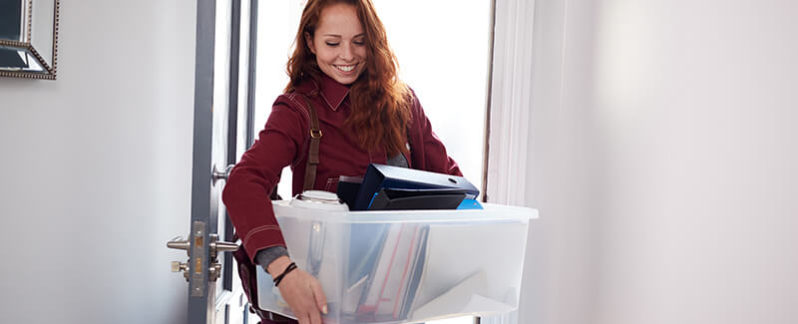
Pandemic Moving Tips: What You Need to Know
August 16, 2020 | Family Life
Becoming financially independent from our parents has always been an essential milestone in growing up in America. But for young people moving home during the pandemic, that right of passage has been strangely interrupted.
In some circles, living at home with mom and dad when you’re over the age of 25 carries a stigma. Not so anymore.
The coronavirus appears to be creating big changes for recently launched young adults and more established Millennials. According to a recent analysis of government data by the real-estate website Zillow, there is a mass migration of young adults moving back to their parent’s and grandparent’s homes.
The report found that roughly 2.7 million U.S. adults moved in with a parent or grandparent in March, April, and May as the coronavirus pandemic spread. Granted, college students comprised a portion of these numbers. But even so, ‘the number of adults living with a parent or grandparent is at an all-time high.” And there is every reason to believe the trend will continue.
So what does it mean when two, possibly three generations of family members live under the same roof? How do 18- and 19-year olds come to terms with having the excitement and freedom that comes from living on campus drastically change or disappear altogether? How do recent grads and established Millennials (maybe with their own children) cope with moving home?
Shelter in Place Alone vs. Isolating with Family
Going to college can be a scary first-step away from home during normal times. But there is little doubt when the pandemic hit, it became terrifying. For young families, the balancing act of working from home with young children is challenging and even more so if one spouse lost a job.
Young adults left cities like New York, Chicago, and Los Angeles in droves to ride out the pandemic in the comfort and safety of home. Simultaneously, college students across the country found themselves panic-packing with just a few days’ notice to get home safely.
Dr. David Markenson, director of the Center for Disaster Medicine at New York Medical College, says, “There are enormous benefits to living with family at this time, from access to healthy food to mental health support.” More adults in a household mean there are more opportunities to engage as a family and offer support to one another whether it be childcare, cooking, doing laundry, or having a shoulder to cry on.
Moreover, family members are going to be responsible when it comes to protecting themselves and their loved ones without worrying about the comings and goings of roommates.
Weighing Luxury vs. Inconvenience
Living in a dorm room or that first apartment often means giving up the comforts and conveniences enjoyed back home. Paying to wash clothes in a public laundromat is an added expense and more than a little stressful during a pandemic.
Moving back home offers the little luxuries in life. Think modern appliances, clean bathrooms, and towels, and perhaps most importantly, access to a backyard.
While returning to a childhood bedroom might mean setting up workstations in the dining room and juggling video conferences from room-to-room, there are going to be some trade-offs – food and support are in ample supply.
Old Family Patterns vs. Starting New Traditions
Families have unique ways they communicate and interact with one another. Now more than ever, it’s important to let the parent/child relationship continue to evolve. While a unicorn-themed bedroom might have been fine during childhood, it’s okay and even advisable to redecorate. Choose furniture and colors that better represent who you are today.
If mom feels sentimental and resists the idea, offer to put childhood treasures and family heirlooms in a clean, secure storage unit.
Moving back in with a spouse, children, a workload, or even just as your 28-year-old single self comes with a different set of challenges. However, no matter what age, young adults need to work with family members to set up healthy boundaries.
This means equally dividing the household chores like cooking and cleaning equally amongst the adults. In households where there are older or immune-compromised adults, it may mean stepping up to take on the role of grocery shopper and errand-runner.
Prolonging Engagement vs. Getting Married
The $78-billion wedding industry, composed of more than 400,000 mom-and-pop vendors, came to a screeching halt when the coronavirus hit. While heartbreaking for businesses and couples who’s wedding dates were set for late spring and summer celebrations, those recently engaged can plan further ahead.
According to weddstats.org, the average cost of a wedding is between $29K-$31K (honeymoon not included!). However, this number varies greatly. In Manhattan, for example, an entry-level wedding budget starts at $70,000.
Giving up tiny apartments with big rents–averaging $1,500 to $2,900 per month–in cities like New York and Chicago was a no brainer for many young adults. Forced lockdowns and work from home requirements meant no social or office life, so why not capitalize on saving money towards future nuptials. For engaged couples living in separate households, that savings could increase substantially for planning a 2021 wedding.
Moving Out of Your Parent’s Home vs. Planning Your Future
Part of becoming an adult is moving a lot and finding different jobs along the journey. Boomeranging back home for a short time is certainly not unheard of before relaunching to become fully independent. But uncertainties surrounding the pandemic make this group even more vulnerable to volatile swings in job and housing markets.
The recent uptick in students and young adults moving home happened amid a crisis. So there was no consideration about whether or not “Gee, I want to live with my parents.” Experts warn that the decision to move back out will be driven by the safety of finding roommates or the high up-front costs of moving into a new apartment alone, especially if the economy is slow to recover.
It probably makes sense for young Millennials and recent grads to ride out economic uncertainty under a sturdy roof: Take time to plan your future. New business models and opportunities are poised to thrive due to the pandemic.
Whether you moved back home due to suspension of on-campus classes, lousy economic conditions, weather the pandemic with loved ones (and not alone!), or all of the above, we’re here to help.
In this era of social distancing, many families are getting closer than ever. And that is a good thing.






